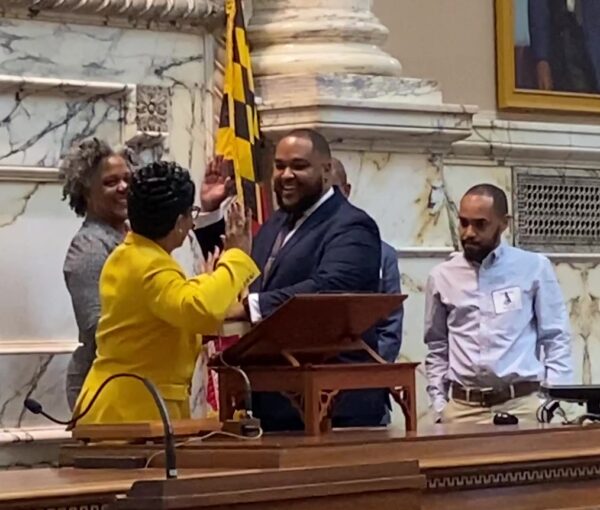
2.25.23 – Maryland Matters – Political Notes:
If you’ve been thinking the pace of the 2023 General Assembly session is slower than some years, you’re not wrong.
A backlog of bills is causing one presiding officer to project a difficult month of March.
“We are not going to be able to pass every bill that either could be passed or should be passed. It’s a logistic impossibility,” said Senate President Bill Ferguson (D-Baltimore City). “We’re going to do the best that we can to prioritize the things we know we have the votes for, the things we know that we can get through and don’t back up additional bills.”
Nearly 1,000 bills have been introduced in the Senate as of Friday. Roughly one-third of those came as the chamber hit its filing deadline.
Friday marked the halfway point of the 90-day session. The date for when each chamber must send its bills to the opposite chamber for consideration without facing additional hurdles is less than four weeks away.
“I think good bills won’t get done,” he said. “I think that’s the case and it’s realistic. We’re going to do the best we can.”
The logjam — not uncommon in the first year of a term — is driven this year by a new administration, new comptroller and attorney general and new lawmakers.
Lawmakers may not be the only ones white-knuckling their way to the March 20 crossover date. Gov. Wes Moore’s bills will also be affected.
“When I talk about the backlog, some of the governor’s bills are caught up in that deluge of 300 bills that were put in on that last day. Just the sheer nature of scheduling, it’s taking time to get them up on the calendar,” said Ferguson.
He said it is “too early to predict” the fate of every bill on Moore’s first legislative agenda.
“We want to work with the governor on all the various ideas that have moved forward,” Ferguson said. “I can’t guarantee one way or the other if all the bills will pass or not. A number of them still have to have hearings.”
Tick tock.
Moore, Hogan to speak to conservative group
Gov. Wes Moore (D) and his two-term Republican predecessor Larry Hogan are both on a list of speakers at the Principles First Summit scheduled for next weekend in Washington, D.C.
Organizers bill the program as an alternative to the conservative lollapalooza known as the CPAC convention which will also be that weekend in the District.
Moore’s image is featured in social media postings.
The 501(c)(4) group bills itself as a collective of “citizens disillusioned with the current state of our politics” who are “committed to revitalizing and championing conservative principles in the 21st century.”
Much of that disillusionment centers around former President Donald Trump. Former Ambassador John Bolton and former Illinois Rep. Adam Kinzinger (R) are billed as speakers.
It’s yet another of Moore’s, and Hogan’s, continued efforts at raising national visibility. Speaking to a group of conservatives, however, seems more unusual for Moore than Hogan.
“When the governor talked about leaving no one behind he meant no one,” said Carter Elliott, a Moore spokesman. “Governor Moore is committed to being a leader for those who did not vote for him as much as he is for those who did.”
Moore’s remarks are expected to touch on the economy and the importance of the FBI headquarters relocating to Prince George’s County.
Failed nominee is fundraising opportunity
Maryland Republican Party Chair Nicole Beus Harris wasted little time turning a rejected nomination into a fundraising opportunity.
The widely distributed letter solicits donations of $50-$500. It comes 24 hours after Harris criticized Gov. Wes Moore (D) in a statement for rejecting a Republican nominee to the Maryland State Board of Elections.
“We need your help to fight this out-of-control administration,” Harris wrote in an email.
Moore cited a number of reasons for rejecting William T. Newton’s nomination. On that list is an embezzlement conviction.
Harris defended Newton as vetted and qualified but said the party would offer up a new nominee.
Prayer protocols clarified
Senate President Bill Ferguson (D-Baltimore City) said Friday that visitors to the chamber are not required to stand during the chamber’s opening prayer, the day after a Montgomery County lawmaker chastised a group of students from an Islamic school for not standing during a prayer.
The students sat quietly in the balcony during the observance, which was offered that day — as it is most days — by a visiting Christian pastor.
“No one is required to stand in violation of sincerely held beliefs,” Ferguson said Friday.
A day earlier, Sen. Cheryl Kagan (D-Montgomery), who is Jewish, addressed the chamber immediately after the prayer, expressing her upset that not everyone present in the chamber was standing.
“I was informed afterwards that it is each person’s personal choice,” Kagan said Friday. “I’ve just, in all of my years in the Senate and in the House, never had that experience before. So I just thought I would share my thoughts.”
Asked whether anyone should be required to take part in a prayer outside their religion, Kagan questioned whether standing would be “taking part in” a prayer, but elaborated that “No one should be forced to pray any particular prayer, or believe in any particular deity, or any deity at all. That’s not the point. It’s a question of respecting this body and respecting the moments of unity.”
Ferguson said he and Kagan discussed the incident after Thursday’s session.
“I didn’t think it was appropriate and I don’t think it will happen again,” Ferguson said of Kagan’s insistence that people in the chamber should stand. “…At the end of the day, the senate president is in charge of the decorum of the chamber and we want people to feel welcome.”
Taking a harder look at budget mandates
A funding bill addressing tuition waivers for some Maryland community college students rang in what is being touted as a new era in how the General Assembly handles mandated spending.
As introduced, Senate Bill 359 required the governor to provide $10 million in state funding for community colleges to make up for the tuition not paid by students receiving waivers.
But Senate Budget Chair Sen. Guy Guzzone (D-Howard) said his committee will now view bills with mandates through the lens of a constitutional amendment passed in 2020 that gives the General Assembly greater power to move money around the state budget proposed by the governor — rather than passing bills mandating spending.
“I see this as probably the first example of us really thinking about whether or not things need to be mandates since we have the ability to adjust things … if in fact the administration doesn’t necessarily include whatever it is we’re interested in,” said Guzzone, noting a key committee amendment that says the governor “may” fund the program, rather than “shall.”
Mandated spending was an issue for Gov. Larry Hogan (R) during his eight years in office. Three-quarters of the budget — or more depending on who does the counting — is mandated by law.
Money for the tuition program is already in the current budget. If the new bill becomes law, Gov. Wes Moore (D) and future governors would have discretion to continue funding at the current level. If the funding is reduced, the legislature could increase it at their discretion as long as it finds a way to cover the costs.
Senate President Bill Ferguson (D-Baltimore) said the change will cause lawmakers to “really think critically and prudently about being fiscally responsible with the state’s money.”
“This is a big deal,” he said.
The bill passed 44-0 in the Senate and now heads to the House of Delegates.
Ashanti Martinez sworn in as delegate
It’s now official.
Ashanti Martinez (D) took the oath of office Friday to become a member of the House of Delegates representing District 22 in Prince George’s County.
Martinez, 26, made history as the first Latino to represent the district. He is also the first openly gay lawmaker representing the majority Black jurisdiction.

Ashanti Martinez (right) is sworn in Friday as the new delegate from District 22 in Prince George’s County. Photo By William J. Ford.
He replaces Sen. Alonzo Washington (D) and will work alongside fellow Democratic Dels. Nicole Williams and Anne Healey. They all represent the district that includes Hyattsville, New Carrollton and Riverdale Park.
Martinez will serve on the Health and Government Operations Committee chaired by fellow Prince Georgian Del. Joseline Peña-Melynk (D), who he considers “like a political mom.” Martinez worked on her campaign as a teenage member of the county’s Young Democrats.
Upon his swearing-in, Martinez expressed interest in voting to accelerate the $15 minimum wage, which is scheduled for a bill hearing Monday before the Economic Matters Committee.
While at the rostrum joined by his parents and his brother, Martinez became emotional in giving a message to those in the LGBTQ community.
“We’re in the House. Live through your pride,” he said. “To all the queer brown boys out there, know that you’re loved. That you’re seen and there’s a place for you here in the Maryland House of Delegates,” he said.
Jones names new House leaders
Montgomery County colleagues will fill leadership roles held in the House of Delegates by outgoing-Del. Ariana Kelley (D-Montgomery), who is scheduled to be sworn into the Maryland Senate on Monday night.
Speaker Adrienne A. Jones (D-Baltimore County) made the assignments Friday morning.
Del. Bonnie Cullison (D-Montgomery) will become vice-chair of the House health and Government Operations Committee.
“Bonnie has helped make insurance more affordable for Marylanders and led several other health care policies that have moved the state forward,” Jones said in a statement. “She has already been a leader in her committee, and I know she’ll make an excellent Vice Chair.”
Del. Jared Solomon (D-Montgomery) will take on the title of deputy speaker pro tem, in addition to his existing role as vice-chair of the Education and Economic Development Subcommittee on the Appropriations Committee.
“Jared has shown initiative and a willingness to take on new, complex issues from childcare to higher education. His drive and teamwork will make him a great addition to the leadership team,” Jones said.
The swearing-in ceremony for Kelly is set for 7 p.m. Monday. She was nominated earlier this month to fill the seat vacated by now-Secretary of State Susan Lee.
